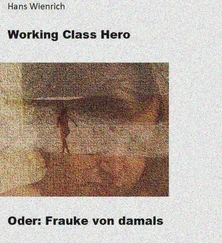MYsecond parole hearing has arrived — second trip to the infirmary, second hearing. I am running a circuit, passing through the same points over and over. There is only one change. Unlike my first hearing, I have no expectations for this one. I will match my voice to that of the balding man. I will not hope.
Guards lead me through the same corridors, and the same guards heckle me on my way through.
“Been stripped of those trustee ranks, have ya, Martin?”
“You a threat, now?”
“Should I be scared?”
“Parole board,” one of my guards says, and the others switch their tone. A few of them wish me luck.
“It’s only his second one,” the guard on my left says.
“Ah, well. Luck to you anyway, Martin.”
My right arm is still bound to my body — I have orders from the doctor not to move the limb for a month — an obscene lump under my shirt, my right sleeve slack and empty.
The balding man is balder now. He still takes up the center seat at the table in the room, and the man on the right seems to be the same one as well. The man on the left is most certainly new, a great beast of a man with hair sprouting from his shirt collar, climbing his enormous neck. He, too, wears the customary dark blue suit.
“Please take a seat,” the bald man says, and I lay my left hand flat on my thigh and sit up tall. The bald man delivers the same opening script, and I tell him — again — that it makes sense. I understand that this board does not doubt my guilt, that they are trying to assess only whether I am ready to return to society without endangering the public.
Again, they review my crime. I see George Haskin’s face before and after his electrocution on the pirated lines I ran. I hear again the figures of money I stole. I see Sheriff Eddings on our porch.
“I’m sorry, Roscoe,” he says, opening the car door for me.
“I see you’ve been working with Deputy Warden Taylor and the prison dogs, is that right?”
“Yes, sir.”
“How do you like that work?”
“I find it enjoyable.”
“Can you see yourself continuing it outside of Kilby?”
“No, sir.”
“Why is that?” the new man asks.
“All due respect, sirs, I don’t imagine there’ll be much need for prison dogs outside of Kilby.”
The large man laughs unexpectedly. “Right enough.” He turns to the bald man. “What kind of outside training is dog work giving them?”
“Tracking skills,” the bald man says. “And animal husbandry.” He is defensive, and the large man looks skeptical.
“You’re still working in the library as well?” the large man asks.
“Yes, sir.”
“And do you see yourself continuing that work?”
Again, I tell them I will organize my father-in-law’s books.
“You’ve suffered injuries since your last parole hearing,” the large man says. “Do they have any lasting effects?”
I point to my right arm hidden away under my shirt. “The doctor doesn’t know what the range of motion will be once it heals. I have a fourteen-inch scar up the center of my abdomen and another scar on my leg. Both of them still hurt when I run.”
No one gets paroled their second time. There doesn’t seem much point to try.
“What about psychologically?” the large man asks. He has taken over the bald man’s job.
I find too many obvious questions here and have no idea what this large man would have me say in response. I’m unclear what constitutes a wholesome psychological reaction to physical violence. Had George Haskin lived, what would his psychological reaction be? Anger? Relief at having lived? Regret? I could tell these three men that my injuries have done little more than everything else in this place, that they are just one more piece, like the wall and the mess and the heat in the cell house. My injuries are not more or less than the dust in the yard and Yellow Mama and Ed’s boat and that damn lighthouse. I did not expect the injuries, but they did not surprise me, and so, I could tell this board that they did nothing, that their impact was neutral, that they were a decent dinner one evening or a painful sermon one Sunday morning or the sounds of the dogs giving chase.
My scars ache and my shoulder, but that is a response to a question I’ve already answered.
“There’s been no psychological effect, sir.”
The large man starts to speak, but the bald man interrupts, “If we were to grant your parole today, what would you do to become an upright member of society?”
“I would go home and help my wife run the farm her father left us.”
“You wouldn’t seek out electrical work?”
“No, sir.”
“Why not?”
“Because I couldn’t get electrical work, sir.” I don’t know if he remembers giving me this answer in my first hearing.
“Any other questions, gentlemen?”
I expect something more from the large one, and at least one word from the silent fellow, but both of them decline. The guard leads me to the bench in the lobby, and I watch the clerks go about their filing and typing. The warden’s office is directly across from us, and I picture him in there smoking.
They keep me out in the hall for at least ten minutes, but when I return to that unfortunate chair, their decision is the same.
“The board feels that you would benefit from more rehabilitation,” the bald man says. “We are denying your parole. Your next hearing will be held in two years.”
“Thank you.” I go with my guards back through the corridors and gates and doors, back to the yard, where they will turn me loose.
The prosecution hadn’t been able to prove exactly when the transformers and the lines went in and finally settled for $1,000 in reparation. The farm carried the debt, and Marie had wanted it gone as soon as possible. Without the men and the thresher, the farm wasn’t making enough money to cover its own expenses, let alone any additional payments, and so she’d sought out a teaching position in Rockford the following fall. Roscoe had been away nearly a year, and Wilson’s sons were doing good work keeping the farm in order. Marie felt she could take herself away. She trusted her father’s land in the hands of Wilson’s family. Gerald came with her to the schoolhouse, though he kept his distance, his nose in his books and his thoughts on his father. Marie saw Roscoe there in the boy’s eyes and his cheekbones and hair. She saw Roscoe in his desire to leave — a son wanting to run from his home. “Gerald!” she would call in class. “What is the answer?”
Only when she directly confronted him would he speak: “Columbus. The capital of Ohio is Columbus.” He always knew.
Marie’s salary was meager, but she was able to put most all of it toward the power debt, and by the spring she’d paid it in full.
Marie wasn’t expecting the man from Alabama Power who arrived on her doorstep a little over a year later in mid-June, summer vacation stretching long and difficult for her and her son. Because the man’s appearance was a surprise, it reminded her of when the sheriff came for Roscoe. She was bristly when she opened the door, stiff and curt.
She spoke through the screen, keeping the latch held tight. “May I help you?”
“Marie Martin?”
“Yes.”
He explained his position with the power company, as well as his intent. “Do you have a moment?”
She didn’t trust him. She didn’t trust anyone with his hands or mind in electricity. The whole enterprise was slippery, dishonest, alternating. Here and then gone. She thought of Roscoe’s explanations, all those passionate lectures he’d given her about forces and impulse — circulation, laps, and runs. All of it was ugly, now, a deeply channeled ugliness that was burned like the body of George Haskin. She saw the prosecutor’s description — the blackened fingers and darkened veins. A book— Parnassus on Wheels —would join this image, and Marie would watch it fly over her head to hit one of her mother’s ceramic plates that hung on the wall, the porcelain falling slowly to the floor, where it shattered against the wood her father had laid, board by board. Gerald came next, his arms bruised purple and blue, yellow tinged at the edge, marks the shapes of his father’s fingers. There was so much to see.
Читать дальше












